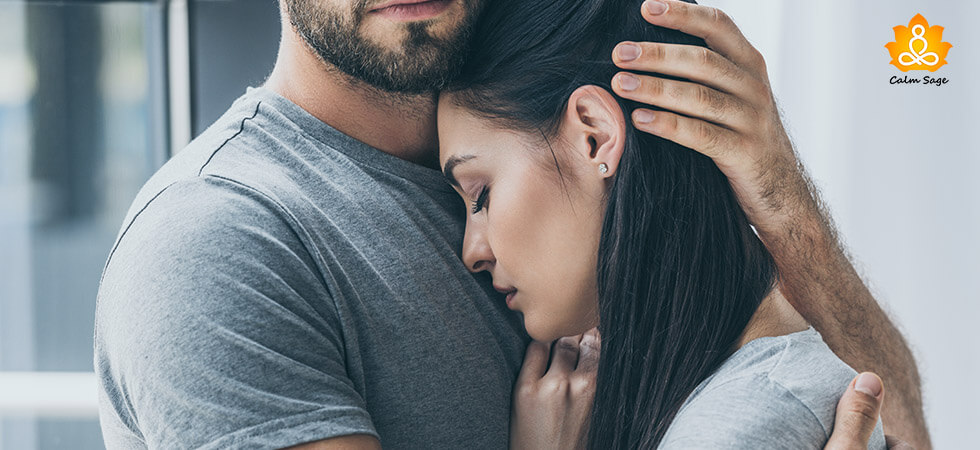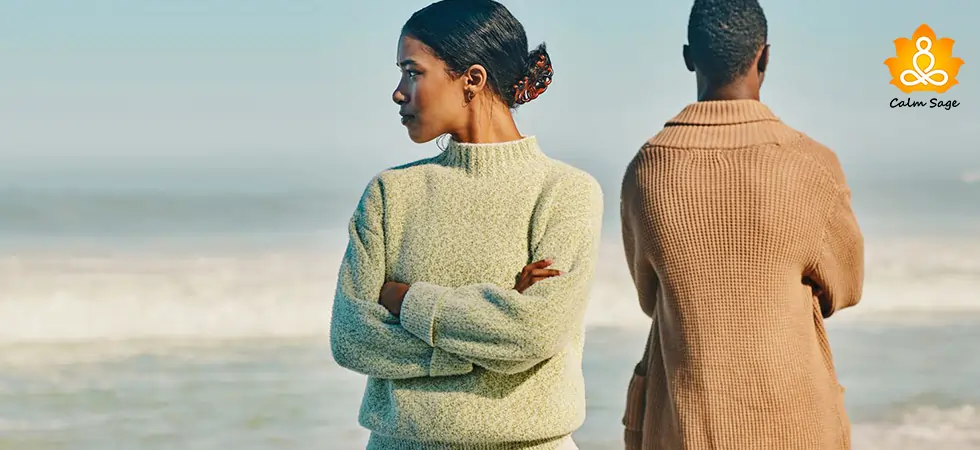How To Cope With Depression When You’re In A Relationship

Dealing with depression can alone be a struggle but when you’re in a committed, loving relationship, you’re more likely to face an overload of emotions and lots of questions.
If you’re struggling with depression, you could – unintentionally – drag your partner down with you. When you’re in a relationship, it’s not all about you alone. Your partner is along with you every step of the way. For better or for worse, right?
Let’s take an example. If you no longer enjoy things that made you happy, prefer to sleep and stay in more than go outside, or if you constantly feel sad, then maybe your partner – who fell in love with a vibrant and fun-loving you, might not feel comfortable anymore. Your relationship may not survive the emotional toll.
When you’re in a relationship and are struggling with depression, it may make your partner, the non-depressed person feel helpless and confused. When they are faced with social withdrawal, no desire to have fun, then they might not understand where the relationship is turning.
Let’s understand how depression in relationships can take a toll on the couple.
How Does Depression Affect Relationships?
Dating while depressed can come with many challenges, especially when you’re looking to form a new romantic relationship. Depression can affect your relationship in many ways, including:
- Emotional distress
- Intimacy
- Communication
- Social withdrawal
- Lack of motivation
- Lack of understanding
When you’re dating someone with depression or are dating when you’re depressed, then you can expect signs of depression such as fatigue, low energy and lack of interest in pleasurable activities, irritability, and continuous sadness.
Depression in a relationship can make you feel away from your partner instead of feeling closer. Relationships, naturally, take a lot of effort, energy, and trust and it can be challenging to put in the effort when you’re depressed.
When someone experiences depression in a relationship, it’s common to find many things unappealing and not find enough motivation to do anything with their partner. So when the partner asks for something, an experience to share even, it may feel like a burden.
If you’re experiencing depression in a relationship, then here are some things you can do:
How to Dealing With Depression In A Relationship
If you or your partner is depressed, you can try these coping tips:
1. Learn About Your Condition
The most important thing to do when you’re dealing with depression in a relationship is to learn about your condition, the signs, causes, and treatment choices. Do your research and share your signs with your partner as well.
Let them know that you’re not well and need help. Present your partner with the information you’ve gathered and you can also ask them to be a part of your treatment.
2. Know What’s True & What’s Fiction
Myths about depression can prevent many people from getting the help they need. To cope with depression, you need to understand the truth and the fiction. Depression is not “just in your head”. If you don’t know about depression, you can educate yourself and stand against the stigma.
You can share the truth with your partner and if your partner is depressed, then knowing the truth about depression can help validate their feelings.
3. Don’t Ignore Self-Care
Coping with depression in a relationship (and even outside a relationship) can be stressful so make sure you take some time to destress and relax. Self-care isn’t selfish but an important coping technique.
You and your partner, both, can try some of these self-care habits:
- Maintaining a healthy diet
- Regularly exercising
- Getting enough sleep
- Participating in hobbies
- Practicing meditation
- Practicing other relaxation techniques
- Spending time in nature and outdoors
- Staying connected with others
4. Seek Support
Whether you or your partner is depressed, seeking support is another effective coping strategy that you can adopt. It’s okay to feel frustrated and angry but you need to not let these feelings grow as these feelings, when not managed, can ruin your relationship.
With the help of therapists, counselors, and support groups you can learn to effectively deal with depression. You can even invite your partner to your session for them to understand how they can help you cope.
If your Partner is Depressed in the Relationship:
1. Support Your Partner
Another important thing you can do when dealing with depression in a relationship is to support your partner and validate their feelings. When your depressed partner needs to vent, listen to them when they open up.
You can also try to offer help with their errands and appointments. Just let your partner know that you’re there for them as they take steps toward recovery.
2. Remember, It’s Not Personal
Depression can make people act differently than they normally do. When this happens, know that it’s okay for your partner to feel angry, withdrawn, and frustrated. Know that it’s okay for them to lose interest in things they previously enjoyed.
It’s all part of depression and you need to remember that it’s not personal. If they snap at you or shut you out, then you need to understand that they don’t mean that. They just need your care and support while they recover.
3. Prioritize Your Time Together
Try to figure out when your partner’s energy is high and try to plan things to do with them during those times. Doing things with them together can make them feel connected and can make them feel less alone.
For instance, if they feel energetic in the morning, then you can plan to eat breakfast together or go on a morning walk together. Try to spend time with them, doing things together, as much as you can.
4. Be A Part Of Their Treatment
Getting treatment for depression is a challenging yet important part of recovery. If your partner is depressed, then you can help them by asking them to let you be a part of their treatment. Ask them if you can accompany them to their therapy sessions. You can also join a support group to learn how to help your partner’s recovery.
All in all, you need to make sure that your partner follows through with their treatment, including going to their therapy appointments and taking medications on time.
5. Ask How You Can Help
As I mentioned above, depression in a relationship can make a person feel like a burden to the other. Here, asking your partner how you can help them can help increase the connection between you two.
Your goal is to keep the communication open. Offer them some suggestions on how you can be a part of their daily routine.
6. Let Them Know They Are Loved
Depression is a condition that can make someone feel helpless and worthless. They may even begin to think themselves unworthy of love. As their partner, you need to make sure that you counteract such thoughts by telling and showing your partner how much they are loved.
Let them know that while you understand how depression is affecting their behaviors and thoughts, they are still loved. Remember, love is a powerful tool and one that can be significant in your partner’s recovery process.
Also Read: When & How To Talk To Your Partner About Your Depression
Are you or your loved one considering suicide? Help is available!
- National Suicide Prevention Lifeline: 1800-273-8255
- Crisis Text Line: text HOME to 741741
- TrevorLifeline: 866-488-7386
- iCall: +91-9152-987-821
- AASRA: +91-9820-466-726
- Vandrevala Foundation: +91-9999-666-555
Dating when depressed can make forming meaningful relationships challenging but there are ways you can learn to cope with depression and help your partner in depression cope with their condition.
I hope the steps mentioned in this article were able to help you learn how to cope with depression in relationships and help your depressed partner cope with their feelings.
For more, you can write to us at info@calmsage.com or DM us on social media. You can also write your thoughts in the comments section below!
Take care and stay safe




















